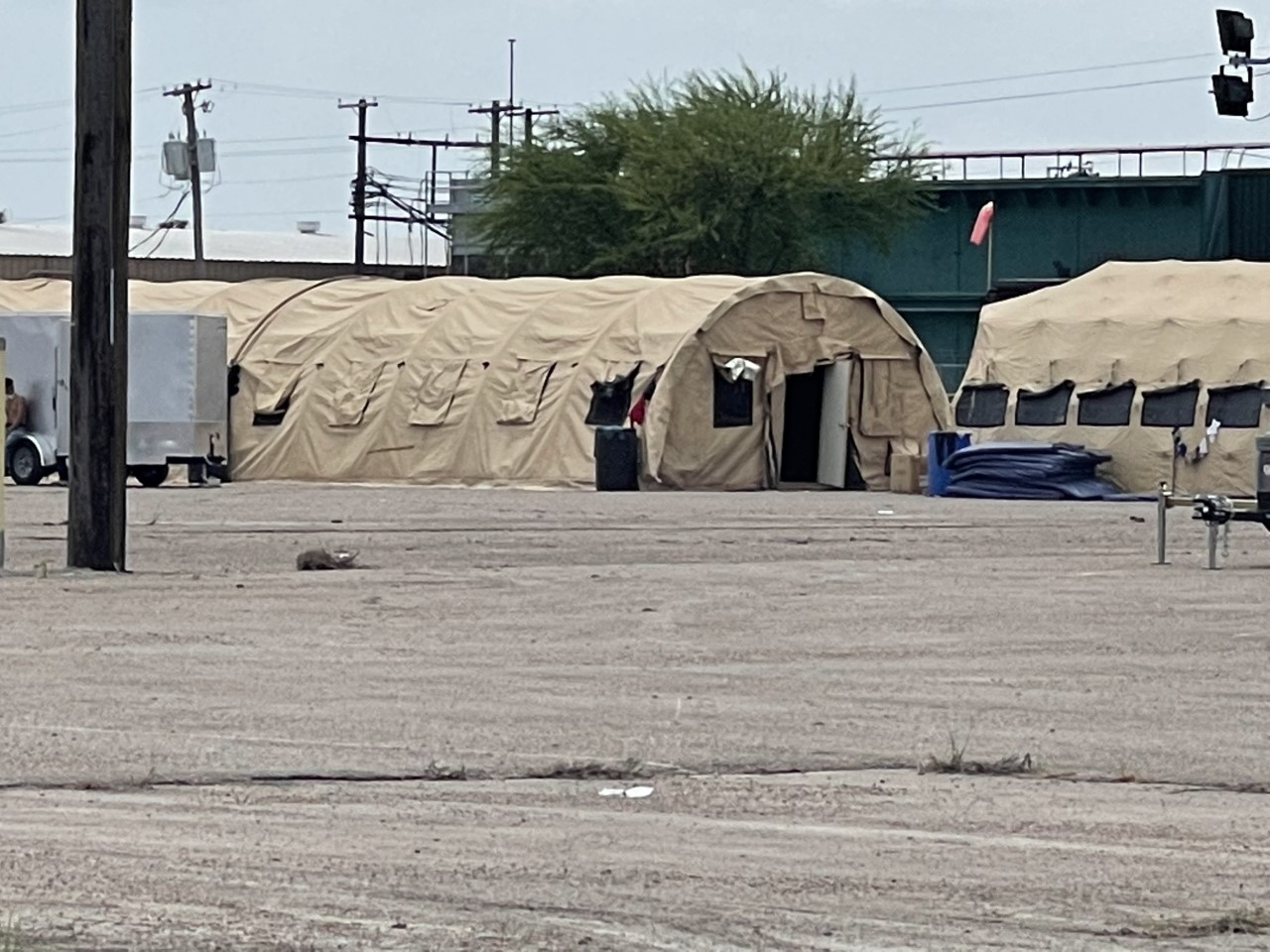[EDITOR’S NOTE: This story has been updated]
McALLEN, Texas (Border Report) — The South Texas border city of McAllen this week put up several tents to house an overflow of migrants with COVID-19 who have been released by federal authorities and have nowhere else to go. But the new tents drew such outcry from residents that late Wednesday city officials announced the facility was being moved.
Overnight Wednesday, six tents had been put up with a capacity to hold 260 migrants, McAllen City Manager Roel “Roy” Rodriguez told Border Report.
Rodriguez said the tents were built to safely house migrants who have at least one family member who tests positive for coronavirus.
But late Wednesday, city officials announced that the entire compound would move further south to a county-owned facility away from residents, who had complained about it.






The South Texas border city of McAllen has put up several tents to house an overflow of migrants with COVID-19 who have been released by federal authorities. (Sandra Sanchez/Border Report)
The new tents appeared Wednesday morning on a gravel dirt lot on 23rd Street in North McAllen, about 3.5 miles from the downtown Humanitarian Respite Center.
Shortly after Border Report arrived, an ambulance came to help an ailing migrant who was seen on the ground being fanned by other migrants. Then construction crews fenced off the area and blocked it from view.
But before it was closed off, groups of migrants — many with young children — could be seen mulling outside the tents in near triple-digit heats, many fanning themselves.
These are the same city-owned tents that had been used in 2014 to help ease a first surge of migrants to the area in 2014, and are the same tents that House Speaker Nancy Pelosi visited when they were behind the Sacred Heart Catholic Church in downtown McAllen.
On Monday, McAllen Mayor Javier Villalobos issued a disaster declaration for the city due to the overwhelming increase of migrants being released by Department of Homeland Security officials in McAllen. Hidalgo County Judge Richard Cortez that same day also issued a similar disaster declaration due to the migrant surge and concerns of coronavirus.
Cortez told Border Report that, on average, 8% of the migrants who are legally released by DHS officials to travel within the United States are testing positive for coronavirus.
To stop the spread of the virus within this border region, and to other U.S. cities, McAllen and Hidalgo County officials and Catholic Charities of the Rio Grande Valley (CCRGV) have partnered to test every migrant who is released.


Since February, CCRGV has been putting up migrant families that have coronavirus in certain area hotels, but last week some migrant families with COVID-19 were at a local burger joint in the nearby town of La Joya, Texas, and that brought national and international scrutiny.
Citing the incident, Texas Gov. Greg Abbott issued an emergency order forbidding anyone other than peace officers from transporting migrants who had crossed into U.S. soil illegally. A federal judge on Tuesday paused Abbott’s order.
Nevertheless, in South Texas, migrants had continued to be moved from place to place.
Morning, noon and night this week busloads carrying 50 to 100 migrants — with many very small children — have been dropped off at a corner in downtown McAllen across from the city’s bus depot and CCRGV’s Humanitarian Respite Center, the largest migrant shelter in the Rio Grande Valley.

The migrants are tested across the street from CCRGV in a converted retail store by healthcare providers run by a non-governmental organization hired by the city and CCRGV. The migrants who are negative for coronavirus are allowed to go to the Respite Center, which holds up to 1,200 people. But last week it reached capacity and had to shut its doors to new arrivals for the first time in years.
That prompted Rodriguez to tell Border Report last week that the situation was dire.
“I think we’re at the worst right now,” Rodriguez said.
The McAllen City Commission on Wednesday evening was holding a special session, which the agenda said was to address the “emergency developments in the immigration surge” as well as recent court rulings relating to the migrants.
DHS does not test the migrants for coronavirus but will treat them if they suspect they are sick. They also do not give vaccines.
The Washington Post on Wednesday reported that vaccinations would soon be given to migrants at the border, but DHS officials told Border Report their policies have not changed.
“The health and safety of our workforce and the migrants in our care are of paramount importance. We continue to monitor and reassess our COVID-19 protocols. At this time, our protocols have not changed.” a DHS spokesman said.